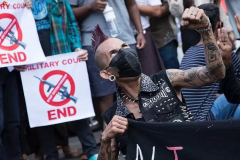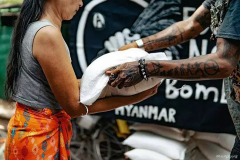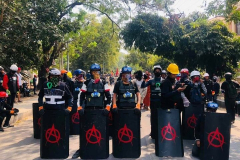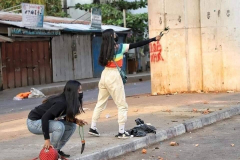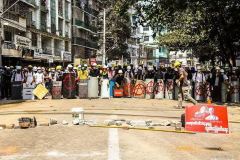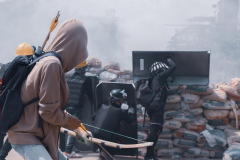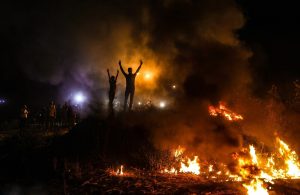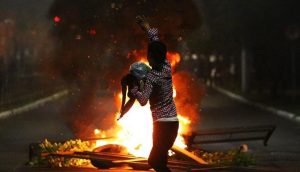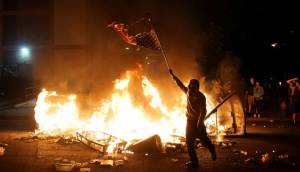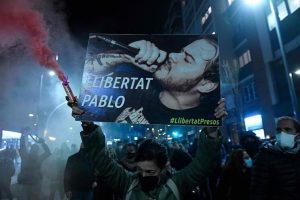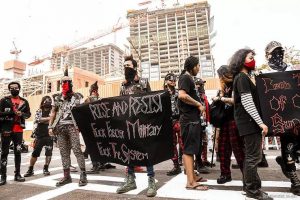
Introduction, May 2021
As of writing this, over seven hundred people have been murdered by the military (Tatmadaw) junta of Myanmar. A coup was conducted on the morning of February 1st, 2021 by the junta under the fabricated excuse of fraud and inconsistencies in the November 2020 election results. With the seizing of power, the military declared a year long state of emergency, transferring the power of both the president and state counsellor to the commander and chief of armed services Min Aung Hliang.
The power grab was not necessarily something new to Myanmar. Myanmar declared independence from British colonial rule in 1948 and the Military seized power in 1962. Before the military junta “officially” dissolved in 2011, there were various attempts to create the facade of a democratic state, but the country has generally been at the mercy of the military’s rule throughout its modern history. While the junta claimed to have dissolved in 2011, it maintained a quarter of parliament regardless of the public’s electoral power. And regardless of the speculation about why the most recent coup came about, it is not a surprise to those aware of Myanmar’s modern history.
What is remarkable to see is the reaction of the people of Myanmar. Not only the will and courage to resist the junta, but the passion for freedom that has united so many groups and communities that have been divided for so many years (to the strategic benefit of the state).
There is so much to learn in order to truly comprehend the situation going on in Myanmar– not only its history, but the intensity of carnage and courage that is happening now– that likely only those on the ground will understand.
We had the privilege of interviewing the Burmese anarcho-punk band The Rebel Riot.
During a brief moment while the band had internet access (as the government routinely shuts down the internet in an effort to prevent footage of their terror from reaching international headlines), we were able to send some questions we had about the situation there, which is of interest to anarchists and anti-fascists who want to support the struggles there and show solidarity abroad. We want to humbly note that these questions were answered by people under war-time conditions. We are proud to present their answers, which we feel demonstrate that actions speak louder then words. Despite the first-world obsessions of the West with theory and academics, the best answers are sometimes the simplest, especially when coming from those who do not have the privilege to consider what type of struggle to pursue, but speak from a position where struggle is simply indispensable.
It is important also that we take a moment as anarchists writing from the West to also acknowledge the essential bridges we must build with the East in pursuit of a truly borderless anarchist solidarity. We will include some links to better understand some aspects of the situation in Myanmar following this interview.
We include this interview to both shine a light on the situation in Myanmar, encourage solidarity, and also encourage financial donations and support from more affluent countries.
Interview
Obviously the situation in Myanmar has become international news, however would you take a moment to describe the situation going on there from your point of view?
The current situation has been intense since February 1st, when the coup began. Many people are arrested daily, and over 700 hundred (that are known of) have been murdered. The people of Myanmar feel a general lack of safety and daily fear for their lives, always wondering whether they will be arrested or maybe killed. They arrest people at random, whether there is proof of individuals participating in resistance or not.
Can you take a moment to explain a little how the country has reached this point. Does Western colonialism have a big role in the origins of the current junta?
From 2010 to 2020, an artificial facade of democracy in Myanmar was made for the world to see, while the whole time it was only the military pulling the strings. The military always wants to maintain the power structure, they have never wanted the elected NLD party (National League for Democracy) to hold power. The NLD won both in 2015 and 2020, however due to the military’s disappointment with the party’s policies, they have used the accusations of electoral fraud to seize power once again. It is all a farce by the junta to rationalize their reign. While Western colonialism effects Myanmar’s history, this current coup’s main foreign culprit is China.
We hear about constant mass murder by the state, both against demonstrators in the cities and armed groups in the country side? Can you further describe the repression happening?
We see the increase in repression as a sign that the state fears the revolutionary solidarity of our movements against them.
As anarchists in Burma how do you build affinity with the various pro-democracy and anti-coup groups that maybe do not share your political outlook?
In this moment, we do not care about picking and choosing which groups we agree with. Many previously divided movements and people have come together as part of a fight against a common enemy. We support every group fighting the junta that we can. We are anarchists, and share our position and ideas on our social media, but our solidarity lies with those who share our enemy of the Myanmar state.
How are anarchists and anti-fascists perceived by other groups struggling against the junta?
We do not know their perception of us as anarchists, we are not among people simply as anarchists, we are among everyone who is fighting for their rights.
Has the uprising against the junta united groups that previously were at odds? If so, will this unprecedented solidarity between so many struggling groups in Myanmar potentially lead to the end of historical divisions in society or is simply means to an end?
We see the junta as the common enemy of everyone who does not support them. So many ethnic groups who have suffered the terror of the junta are fighting alongside each other, joining in with the broader revolt of the population. Everyone is coming together united against this terror, oppressed ethnic groups and Bamars have united against the junta, and this is a positive and unprecedented result of the struggle against the current military regime.
Are there particular groups you tend to support more in this fight against the junta over others?
We support the GSC (General Strike Committe) because participants in this committee include many on the left, as well as many people from the unions of the students and the workers.
How does resistance to the junta vary throughout the country? Does the dynamic of struggle vary by the city or region? We are seeing riots in some cities, as well as armed struggle in the countrysides; with the relentless military assaults by the junta on the people, some are concerned that things may begin to resemble the civil war in Syria. Is this type of civil war something you think may be inevitable if the military refuses to surrender to the people?
Resistance varies throughout the country. It depends on the group, the terrain, and the will of those engaged. Conditions also vary by region, and resistance must adapt to both urban and rural terrains. Support for the revolution also varies by region depending on the demographics of the population. You have some cities participating entirely in the general strike, with some cities only partially participating. It is not simple to provide an answer to this, and with an actively changing situation, as well as me not being a political expert, I can not foretell if we will become Syria.
Is there a general strike happening in the country? If so, is it having an impact?
General strike has been happening around the country. The strike is definitely having an impact, and threatening the foundation of the junta’s rule.
We have read that in light of the general strike potentially effecting food and resource supplies, as well as worker stability, networks of mutual aid are happening naturally by the people in order to keep struggles strong, and communities stable. Is this a reality, a fantasy, or something more complicated?
Solidarity between civilians has been the most vital element of this social movement against the junta. Despite tough conditions, the will of the people to support each other against this common enemy has been the foundation of food and supplies being available. Even in covid times, our solidarity keeps us going. It is not a fantasy, our solidarity is the force keeping our humanity alive out here.
The west has blindly supported Aung San Suu Kyi, giving her a Nobel peace price, while she wilfully ignored the genocide of the Rohingya as well as various other atrocities committed by the military. With so many in the streets supporting her and the West scrambling to appoint her as the leader of everything, how do you feel about her as anarchists?
I personally have admiration and respect Aung San Suu Kyi. People are fighting for freedom, not only for her. But she has been fighting for democracy and for her people for many years. I have mixed feelings though about her as well. While I admire here for the sacrifices she has made fighting for democracy and the people of Myanmar, I wouldn’t agree that she is to be the political icon or hero of our country or movement. I also take serious issue with her silence when it comes to oppressed ethnic groups, especially the Rohingyas whom have faced genocide.
In previous anti-junta demonstrations, you had the west celebrating Buddhist monks “peacefully” resisting the military in pursuit of “democracy”. Of course when the military controls unconditionally a quarter of parliament, such a “democracy” is nothing more then a farce. However many of these “anti-junta” Buddhist monks have taken viciously nationalistic and racist perspectives on marginalized people such as the Rohingya; attacking and burning villages, and creating the groundwork for one of the biggest refugee crisis in the world. Are these types of monks continuing to play a role in the on-going revolt, and if so how do you deal with such people?
We have three types of monks here. The first are those who participated in the Saffron Revolution. Most of the monks who participated in Saffron Revolution are pro-democracy, and care about human dignity and an open mind. The second type of monks are 969 and MABATA monks. They are pro-military, racist, sexist, and homophobic. Most of them are anti-Rohingya and anti-Muslim. The third type of monks are not interested in politics. They mainly focus on religion and charity but many are are also the puppets of the junta.
Who is the base of support for the military? Who actually does support these bastards? Does this include the former members of the far-right Buddhist nationalist 969 movement?
Most people who support the military are cronies, 969 Buddhist monks, military tycoons and elite, and celebrities who rely on a fame that is maintained by their military connections.
In Syria’s civil war you had regions experiencing famine and chemical warfare while the military controlled city of Damascus appeared to simultaneously have a certain degree of normalcy when it comes to everyday life. Is the entire country engulfed in protests and resistance against the junta, or does it vary region by region depending on loyalty to the junta?
Every region is different. Some regions have more internet and media blackouts then others. Those with more blackouts tend to be areas with more resistance. These regions also typically face more repression and arrest. Some regions are already in what many would claim resembles a civil war. However it is hard to know the future, but I would say that a normalcy here to Syria is more and more likely if the junta refuses to step down, as such few people support them.
What is your take on the potential for Western intervention? Can sanctions do anything to the junta, or do they only cripple the poorest people in Myanmar?
Sanctions cripple the economy for sure, affecting both sides. Loss of employment and an increase in precarity certainly happens to the poor as a result of international sanctions. However it also cripples the economy in a way that destabilizes the junta as well. Unfortunately though, the more the economy is crippled, the more repression is inflicted by the junta onto the working class.
Is there a need for financial support or other logistical support? If so, are there safe and reliable ways to for people to donate from abroad, and specific funds or organizations that you suggest contributing to?
We need both financial support and logistical support. You can organize a protest in your own country at the Myanmar Embassy. If anyone would like to support our efforts financially you can donate through our Messenger on our page: Food Not Bombs Myanmar.
Apart from financial and or resource support needed, what is your message to those on the outside world? What ways can people demonstrate solidarity with your struggle?
Fascism and authoritarianism is not only a problem of Myanmar, it is a problem around the world. In order to create a better world, we must fulfill our duties as humans and resist fascism and authoritarianism everywhere. If we ignore this malicious system, we will allow for more evil to control the world.
We need world solidarity to fight the fascist system.
Some links and articles to further understand the political situation in Myanmar:
Anti-Fascist Solidarity With The Revolution In Myanmar
Keep the Streets: Coup, Crisis, and Capital in Myanmar
Rebel Riot: The punk soundtrack to Myanmar’s anti-coup protests

